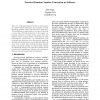Free Online Productivity Tools
i2Speak
i2Symbol
i2OCR
iTex2Img
iWeb2Print
iWeb2Shot
i2Type
iPdf2Split
iPdf2Merge
i2Bopomofo
i2Arabic
i2Style
i2Image
i2PDF
iLatex2Rtf
Sci2ools
ACSAC
2003
IEEE
2003
IEEE
Practical Random Number Generation in Software
There is a large gap between the theory and practice for random number generation. For example, on most operating systems, using /dev/random to generate a 256-bit AES key is highly likely to produce a key with no more than 160 bits of security. In this paper, we propose solutions to many of the issues that real software-based random number infrastructures have encountered. Particularly, we demonstrate that universal hash functions are a theoretically appealing and efficient mechanism for accumulating entropy, we show how to deal with forking processes without using a two-phase commit, we explore better metrics for estimating entropy and argue that systems should provide both computational security and information theoretic security through separate interfaces.
Related Content
| Added | 04 Jul 2010 |
| Updated | 04 Jul 2010 |
| Type | Conference |
| Year | 2003 |
| Where | ACSAC |
| Authors | John Viega |
Comments (0)

